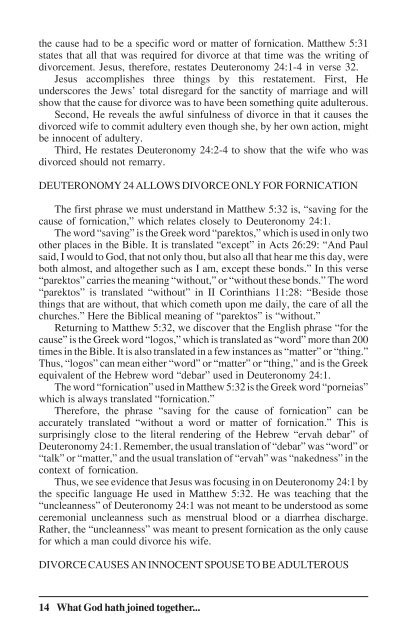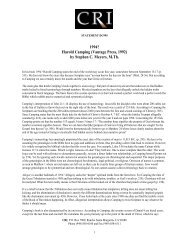What God Joined Together - Family Radio
What God Joined Together - Family Radio
What God Joined Together - Family Radio
Create successful ePaper yourself
Turn your PDF publications into a flip-book with our unique Google optimized e-Paper software.
the cause had to be a specific word or matter of fornication. Matthew 5:31<br />
states that all that was required for divorce at that time was the writing of<br />
divorcement. Jesus, therefore, restates Deuteronomy 24:1-4 in verse 32.<br />
Jesus accomplishes three things by this restatement. First, He<br />
underscores the Jews’ total disregard for the sanctity of marriage and will<br />
show that the cause for divorce was to have been something quite adulterous.<br />
Second, He reveals the awful sinfulness of divorce in that it causes the<br />
divorced wife to commit adultery even though she, by her own action, might<br />
be innocent of adultery.<br />
Third, He restates Deuteronomy 24:2-4 to show that the wife who was<br />
divorced should not remarry.<br />
DEUTERONOMY 24 ALLOWS DIVORCE ONLY FOR FORNICATION<br />
The first phrase we must understand in Matthew 5:32 is, “saving for the<br />
cause of fornication,” which relates closely to Deuteronomy 24:1.<br />
The word “saving” is the Greek word “parektos,” which is used in only two<br />
other places in the Bible. It is translated “except” in Acts 26:29: “And Paul<br />
said, I would to <strong>God</strong>, that not only thou, but also all that hear me this day, were<br />
both almost, and altogether such as I am, except these bonds.” In this verse<br />
“parektos” carries the meaning “without,” or “without these bonds.” The word<br />
“parektos” is translated “without” in II Corinthians 11:28: “Beside those<br />
things that are without, that which cometh upon me daily, the care of all the<br />
churches.” Here the Biblical meaning of “parektos” is “without.”<br />
Returning to Matthew 5:32, we discover that the English phrase “for the<br />
cause” is the Greek word “logos,” which is translated as “word” more than 200<br />
times in the Bible. It is also translated in a few instances as “matter” or “thing.”<br />
Thus, “logos” can mean either “word” or “matter” or “thing,” and is the Greek<br />
equivalent of the Hebrew word “debar” used in Deuteronomy 24:1.<br />
The word “fornication” used in Matthew 5:32 is the Greek word “porneias”<br />
which is always translated “fornication.”<br />
Therefore, the phrase “saving for the cause of fornication” can be<br />
accurately translated “without a word or matter of fornication.” This is<br />
surprisingly close to the literal rendering of the Hebrew “ervah debar” of<br />
Deuteronomy 24:1. Remember, the usual translation of “debar” was “word” or<br />
“talk” or “matter,” and the usual translation of “ervah” was “nakedness” in the<br />
context of fornication.<br />
Thus, we see evidence that Jesus was focusing in on Deuteronomy 24:1 by<br />
the specific language He used in Matthew 5:32. He was teaching that the<br />
“uncleanness” of Deuteronomy 24:1 was not meant to be understood as some<br />
ceremonial uncleanness such as menstrual blood or a diarrhea discharge.<br />
Rather, the “uncleanness” was meant to present fornication as the only cause<br />
for which a man could divorce his wife.<br />
DIVORCE CAUSES AN INNOCENT SPOUSE TO BE ADULTEROUS<br />
14 <strong>What</strong> <strong>God</strong> hath joined together...




